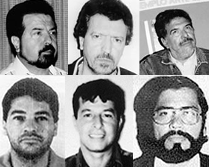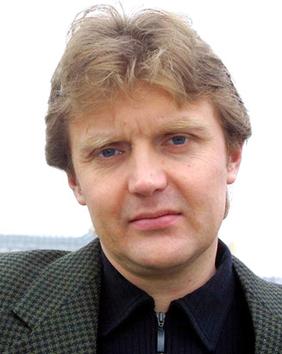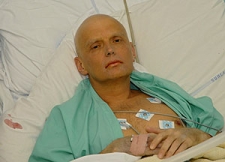Related Research Articles

The Cali Cartel was a drug cartel based in southern Colombia, around the city of Cali and the Valle del Cauca. Its founders were the brothers Gilberto Rodríguez Orejuela, Miguel Rodríguez Orejuela and José Santacruz Londoño. They broke away from Pablo Escobar and his Medellín associates in 1988, when Hélmer "Pacho" Herrera joined what became a four-man executive board that ran the cartel.
The Russian mafia, otherwise referred to as bratva, is a collective of various organized crime related elements originating in the former Soviet Union (FSU). Any of the mafia's groups may be referred to as an "Organized Criminal Group". This is sometimes modified to include a specific name, such as the Orekhovskaya OPG. Sometimes, the Russian word is dropped in favour of a full translation, and OCG is used instead of OPG.

In September 1999, a series of explosions hit four apartment blocks in the Russian cities of Buynaksk, Moscow, and Volgodonsk, killing more than 300, injuring more than 1,000, and spreading a wave of fear across the country. The bombings, together with the Invasion of Dagestan, triggered the Second Chechen War. The handling of the crisis by Vladimir Putin, who was prime minister at the time, boosted his popularity greatly and helped him attain the presidency within a few months.

Nikolai Platonovich Patrushev is a Russian politician, security officer and former intelligence officer who served as the secretary of the Security Council of Russia from 2008 to 2024. He previously served as the director of the Federal Security Service (FSB) from 1999 to 2008. Belonging to the siloviki faction of president Vladimir Putin's inner circle, Patrushev is believed to be one of the closest advisors to Putin and a leading figure behind Russia's national security affairs. He played a key role in the decisions to seize and then annex Crimea in 2014 and to invade Ukraine in 2022.
Mikhail Ivanovich Trepashkin is a Russian attorney and former Federal Security Service (FSB) colonel who was invited by MP Sergei Kovalev to assist in an independent inquiry of the Russian apartment bombings in September 1999 that followed the Dagestan war and were one of the causes of the Second Chechen War. During his investigation, he was arrested by the FSB and sentenced to four years' imprisonment for "revealing state secrets". His arrest has been criticized by a number of human rights organizations and he has been called a political prisoner.

On 7 October 2006, Russian journalist, writer and human rights activist Anna Politkovskaya was shot dead in the elevator of her apartment block in central Moscow. She was known for her opposition to the Chechen conflict and for criticism of Vladimir Putin. She authored several books about the Chechen wars, as well as Putin's Russia, and received several international awards for her work. Her murder, believed to be a contract killing, sparked a strong international reaction. Three Chechens were arrested for the murder, but were acquitted. The verdict was overturned by the Supreme Court of Russia and new trials were held. In total, six people were convicted of charges related to her death.

Alexander Valterovich Litvinenko was a British-naturalised Russian defector and former officer of the Russian Federal Security Service (FSB) who specialised in tackling organised crime. A prominent critic of Russian President Vladimir Putin, he advised British intelligence and coined the term "mafia state".

Yuri Petrovich Shchekochikhin was a Soviet and later Russian investigative journalist, writer, and liberal lawmaker in the Russian parliament. Shchekochikhin wrote and campaigned against the influence of organized crime and corruption. His last non-fiction book, Slaves of the KGB, was about people who worked as KGB informers.

Sergei Nikolayevich Yushenkov was a liberal Russian politician. He was assassinated on 17 April 2003, just hours after registering his political party to participate in the December 2003 parliamentary elections.

Alexander Litvinenko was an officer of the Russian Federal Security Service (FSB) and its predecessor, the KGB, until he left the service and fled the country in late 2000.
The Tambovskaya Bratva is a large gang in Saint Petersburg, Russia. According to common allegations, it was organised in Leningrad in 1988 by two men from Tambov Oblast, Vladimir Kumarin and one from St. Petersburg. The gang is named after their region of origin. Despite allegations, Kumarin continues to deny his involvement. Originally the gangsters were recruited from people of Tambov origin and sportsmen, and were engaged in a protection racket.

Alexander Vasilyevich Bortnikov is a Russian intelligence officer who has served as the director of the Federal Security Service (FSB) since 2008. He is one of the most powerful members of the silovik faction of president Vladimir Putin's inner circle. A Hero of the Russian Federation since 2019, he also holds the rank of General of the Army, the second highest grade in use in the Russian military. According to some experts, it is likely Bortnikov played a key role in Putin's decision to invade Ukraine in 2022.

Blowing Up Russia: Terror from Within is a book written by Alexander Litvinenko and Yuri Felshtinsky. The authors describe the Russian apartment bombings as a false flag operation that was guided by the Russian Federal Security Service to justify the Second Chechen War and bring Vladimir Putin to power. The story was initially printed by Yuri Shchekochikhin in a special issue of Novaya Gazeta in August 2001 and published as a book in 2002. In Russia, the book was prohibited because it divulged state secrets, and it was included in the Federal List of Extremist Materials. However, it was published in more than twenty other countries and translated into twenty languages.
The poison laboratory of the Soviet secret services, alternatively known as Laboratory 1, Laboratory 12, and Kamera, was a covert research-and-development facility of the Soviet secret police agencies. Prior to the dissolution of the Soviet Union, the laboratory manufactured and tested poisons, and was reportedly reactivated by the Russian government in the late 1990s.
The Solntsevskaya Organized Crime Group, also known as the Solntsevskaya Bratva, is a Russian crime syndicate group.
Vyacheslav Kirillovich Ivankov was a Russian mafia boss and thief in law who was believed to have connections with Russian state intelligence organizations and their organized crime partners. He operated in both the Soviet Union and the United States. His nickname, "Yaponchik" (Япончик), translates from Russian as "Little Japanese", due to his faintly Asian facial features.
The Brothers' Circle or Bratski Krug is a term used to refer to Russian organized crime, commonly the Russian mafia. It is a loose translation of the Russian term "Bratva", which can also be loosely translated as “brotherhood” or “band of brothers". The term "bratva" received its wide dissemination in the 1990s after the collapse of the Soviet Union, and was used as an informal address among the members of many gangs which spread throughout post-soviet republics. Today the term is used as an informal way of addressing close friends. This form of address and lack of proper interpretation resulted in its name being used in connection to Russian organized crime.
Salim Kirgizbaevich Abduvaliev is an Uzbek businessman film producer and the current Vice President of the National Olympic Committee of the Republic of Uzbekistan. In 2015 as film producer, he was awarded the "Do’slik" State Prize of Uzbekistan and the "XVI Ludwig Nobel Prize" in 2022. He popularly is known as "Salimboyvachcha".

Vadim Nikolayevich Krasikov is a Russian security service hitman who was sentenced to life imprisonment in Germany for the killing of 40-year-old Zelimkhan Khangoshvili in Berlin, Germany, on August 23, 2019. On August 1, 2024, he returned to Russia after a prisoner exchange between Russia and the West. One of the prisoners involved in the exchange for Krasikov, Ilya Yashin, would condemn the fact that he was specifically freed in exchange for him due to Krasikov originally being sentenced to life in prison for the murder of Khangoshvili.
References
- ↑ "Gafur Rakhimov elected president of Aiba despite IOC criticisms". 3 November 2018. Retrieved 25 December 2018.
- ↑ Morgan, Liam. "Rakhimov formally resigns as International Boxing Association President". insidethegames.biz. Retrieved 3 July 2021.
- ↑ Khaknazarov, Usman (20 February 2003). "Renascence of "Power Broker" of Uzbek Policy: Or how Uzbek president Islam Karimov is reverting to the hands of his first master". muslimuzbekistan.com. Archived from the original on 26 May 2006. Retrieved 21 December 2020.
- ↑ Gafur Rakhimov's official website - Bibliography Archived 2012-04-28 at the Wayback Machine
- ↑ "Rakhimov Garfur Akhmedovich: Biography". Rakhimov Garfur Akhmedovich Personal Internet Site. Archived from the original on 19 June 2006. Retrieved 21 December 2020.
- ↑ Щекочихин, Юрий (Shchekochikhin, Yuri) (25 May 1998). "Брат Плащ и Кинжал-3. Может ли проиграть в казино $120 000 начальник одного из самых секретных управлений ФСБ? Депутатский запрос заместителя главного редактора "Новой газеты" Юрия Щекочихина" [Brother Cloak and Dagger-3. Can a boss of one of the most secret FSB departments lose $ 120,000 in a casino? Deputy request of the deputy chief editor of "Novaya Gazeta" Yuri Shchekochikhin]. Novaya Gazeta (in Russian). Archived from the original on 18 April 2001. Retrieved 8 January 2021– via Агентура (Agentura).
{{cite news}}: CS1 maint: multiple names: authors list (link) - ↑ "В ФСБ создано УРПО" [URPO created in FSB]. Агентура (Agentura) (in Russian). 12 August 2000. Archived from the original on 28 January 2007. Retrieved 8 January 2021.
- ↑ "А был ли киллер?" [Was there a killer?]. Komsomolskaya Pravda (in Russian). Archived from the original on 14 May 2001. Retrieved 8 January 2021– via Novosti.
- ↑ Кириленко, Анастасия (Kirilenko, Anastasia) (21 January 2016). "Путин и мафия. За что убили Александра Литвиненко" [Putin and mafia. Why Alexander Litvinenko was killed]. The Insider (in Russian). Archived from the original on 23 January 2016. Retrieved 18 December 2020.
{{cite news}}: CS1 maint: multiple names: authors list (link) - ↑ Litvinenko, Alexander Схема связей преступного мира, нарисованная Литвиненко (Litvinenko's diagram of the connections of the underworld) Archived from the original on 23 January 2016.
- ↑ Радио Озодлик (Radio Ozodlik) (24 February 2016). Литвиненко утверждал о связях «узбекских бандитов Гафура и Салима» с Путиным (Litvinenko claimed links between "Uzbek bandits Gafur and Salim" with Putin). Радио Озодлик . Retrieved 18 August 2021.
- ↑ Литвиненко, Александр (Litvinenko, Alexander) (2002). ЛПГ (Лубянская преступная группировка) (LPG (Lubyanka criminal group)). Retrieved 18 August 2021.
- ↑ Литвиненко, Александр (Litvinenko, Alexander) (2002). Глава 4. Узбекский след (Chapter 4. Uzbek trace). Retrieved 18 August 2021.
- ↑ Кириленко, Анастасия (Kirilenko, Anastasia) (16 December 2013). "Путин на "личной службе" у князя Альбера" [Putin on "personal service" with Prince Albert]. Радио Свобода (Radio Svoboda). Archived from the original on 9 October 2016. Retrieved 20 December 2020.
{{cite news}}: CS1 maint: multiple names: authors list (link) - ↑ Treasury Imposes Sanctions On Key Members Of The Yakuza And Brothers' Circle Criminal Organizations
- ↑ "U.S. Sanctions Top Members of Crime Groups". OCCRP . 26 February 2012. Retrieved 21 December 2020.
- ↑ "Obama Calls "Brothers' Circle" a National Security Threat...But Who Are They?". Hetq Online . 14 March 2012. Archived from the original on 18 March 2012. Retrieved 21 December 2020.
- ↑ "Who Is The Brothers' Circle?". OCCRP . 12 March 2012. Archived from the original on 19 March 2012. Retrieved 21 December 2020.
- ↑ "US: New Sanctions Against Brothers' Circle". OCCRP . 7 June 2012. Retrieved 21 December 2020.
- ↑ "Boxing Aims to Please the IOC -- ATRadio".
- ↑ "Uzbek Olympic Official Wins Case". February 2002.